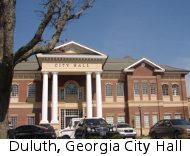8/7/2009
Georgia: Benefit of Increased Yellow ContinuesLonger yellows cut violations in Georgia. Norcross dumps cameras while Duluth keeps them.

The benefits of a mandated increase in yellow light timing at photo enforced intersections in Georgia have not diminished after six months. In response, the city of Norcross is dumping red light cameras while Duluth is keeping them. The Norcross City Council made its final decision Monday based on the continued low number of violations following the timing change. The city of Duluth, on the other hand, voted last week to keep cameras even though the number of potential tickets has not increased.
The problems for Georgia's red light camera programs began when state Representative Barry Loudermilk (R-Cassville) and Senator Jack Murphy (R-Cumming) crafted a law that forced cities to increase the duration of yellow signals by one second at any intersection monitored by a red light camera. Proponents of automated ticketing insisted at the time that the benefits of the change would only be temporary as drivers adapted to the longer yellows.
"This change reduced the revenue to nothing and in fact we were losing money by keeping the lights up," Duluth City Administrator Phil McLemore said in an email. "Since our city-wide revenue has decreased approximately $4 million this budget year due to the economy from all sources including property taxes we could not afford to subsidize something that did not break even on costs."
The most recent data available from Lasercraft, the UK company that operates red light cameras in Duluth and Norcross for a cut of the profit, show that violations continue to be significantly down as a result of the longer yellows.
Duluth's five camera approaches issued 788 tickets in January 2008 with the original, short yellow timing. By April 2009, the number of alleged violations was still just 284 -- a 64 percent reduction. Despite the hope that the number of citations would increase over time, the difference between February 2009 (the first full month with longer yellow) and April 2009 was 16 percent. A closer examination of the figures shows that half of the intersections fluctuated up and the other half fluctuated down in this period. Lasercraft estimated Duluth's net profit would be $68,116 per year taking into account a discounted service fee that will expire in May 2010. The city can end its contract at any time with sixty days' notice.
In Norcross, the number of tickets issued at three intersections with a shorter yellow time in January 2008 was 482. With the longer yellow, the April 2009 alleged violation figure was 198 -- a drop of 59 percent. Lasercraft has made it clear to local officials that its goal is to increase, not decrease, the number of violations.
"We expect to continue to see red light running incidents increase, especially in the upcoming summer months," Lasercraft promised in a memo to the city council. "In order to realize a more favorable financial model, citation counts need to increase."
A company document labeled the intersection with the most alleged violations, Beaver Ruin Road and Buford Highway, as having "good performance." Even so, the number of alleged violations in April 2009 -- the latest available figure -- stood at half the number generated in 2008 thanks to the longer yellow.
Lasercraft estimated it could issue 144 tickets a month at the two most profitable Norcross intersections, generating $96,528 in annual revenue. After Lasercraft's cut, the city would be left with $47,326 in profit. Lasercraft suggested that it could further maximize profit if the city turned more of the process over to the firm's automated computer systems.
"Lasercraft also has new technology enhancements that automate more of the incident capture and processing, reducing the overall operating costs of the system," the company explained. "Lasercraft also offers a full service processing option where printing, mailing, collection, hearing scheduling and call center activities are performed in our Norcross processing center instead of by the city of Norcross."
Ultimately, Norcross rejected the idea, noting that the company's rate of $2400 per month for the cameras would increase to $5300 per month by May 2010.
A copy of performance statistics from both cities and Duluth's new contract is available in a 400k PDF file at the source link below.


